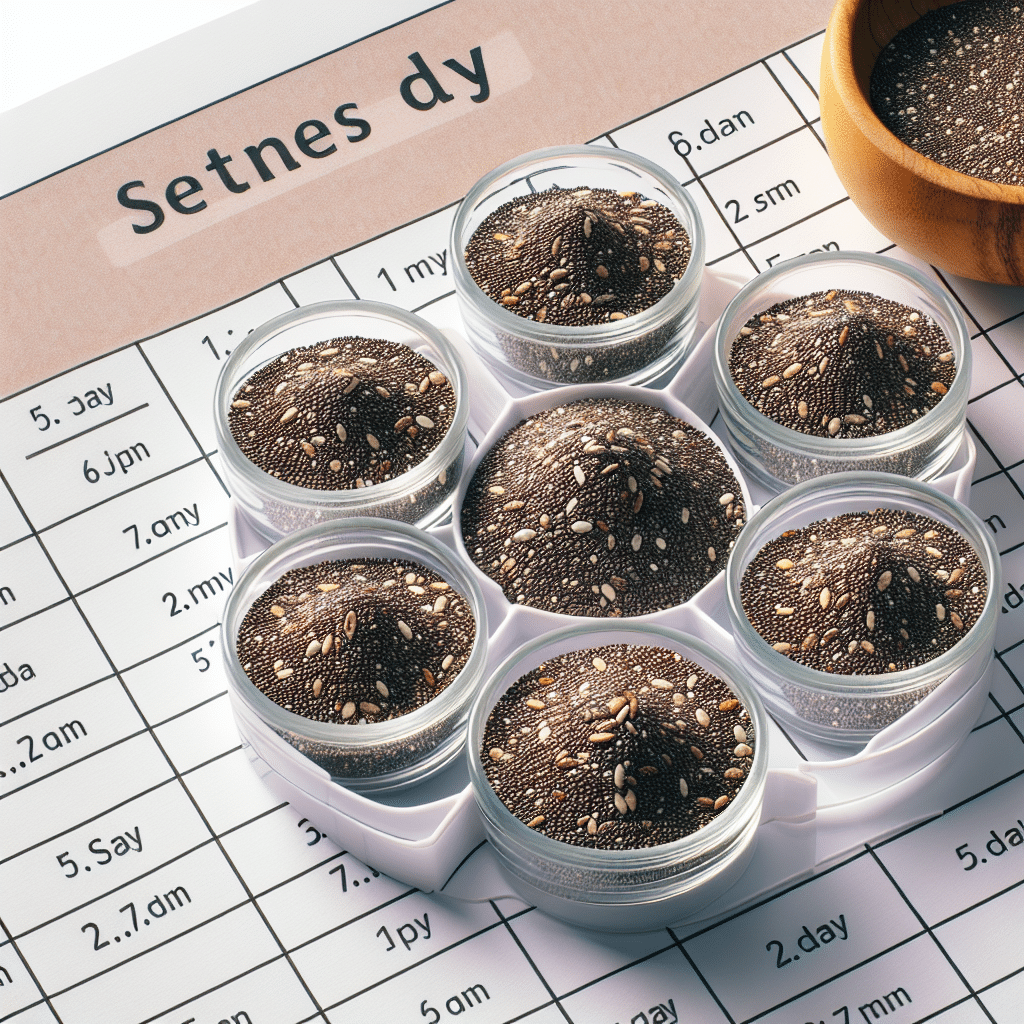How Many Times A Week Should You Eat Chia?
-
Table of Contents
- Chia Seeds Frequency: Optimal Consumption for Health Benefits
- Understanding Chia Seeds
- Recommended Frequency of Chia Seed Consumption
- Daily Intake and Digestive Health
- Caloric Considerations
- Omega-3 Fatty Acids and Balance
- Health Benefits of Regular Chia Seed Consumption
- Cardiovascular Health
- Weight Management
- Blood Sugar Regulation
- Bone Health
- How to Incorporate Chia Seeds into Your Diet
- Potential Risks and Considerations
- Conclusion: Balancing Chia Seed Intake for Optimal Health
- Enhance Your Diet with ETprotein’s High-Quality Protein Products
Chia Seeds Frequency: Optimal Consumption for Health Benefits

Chia seeds have gained immense popularity in the health and wellness community due to their rich nutritional profile and versatile use in various recipes. However, with any dietary addition, it’s essential to understand the optimal frequency of consumption to maximize health benefits while minimizing any potential risks. This article delves into how many times a week you should eat chia seeds, supported by scientific research and expert recommendations.
Understanding Chia Seeds
Chia seeds are tiny black seeds from the plant Salvia hispanica, which is native to Central America. They were an important food for the Aztecs and Mayans, prized for their ability to provide sustainable energy. In fact, “chia” is the ancient Mayan word for “strength.”
These seeds are a powerhouse of nutrients, containing:
- Omega-3 fatty acids
- High-quality protein
- Dietary fiber
- Antioxidants
- Calcium
- Magnesium
- Phosphorus
Due to their nutrient composition, chia seeds can have numerous health benefits, including improved cardiovascular health, digestive health, and weight management.
Recommended Frequency of Chia Seed Consumption
While chia seeds are beneficial, moderation is key. The general recommendation for chia seed intake is about 1-2 tablespoons (15-30 grams) per day. This amount allows you to reap the health benefits without overconsuming calories or fiber.
Daily Intake and Digestive Health
Chia seeds are very high in fiber, which is beneficial for digestive health. However, consuming too much fiber too quickly can lead to digestive issues such as bloating and gas. Gradually increasing your intake of chia seeds can help your digestive system adjust.
Caloric Considerations
Chia seeds are relatively high in calories, with about 70 calories per tablespoon. If you’re watching your calorie intake for weight management, be mindful of the quantity of chia seeds you add to your diet.
Omega-3 Fatty Acids and Balance
Chia seeds are an excellent source of alpha-linolenic acid (ALA), a type of omega-3 fatty acid. However, balance is crucial, as too much ALA without a corresponding intake of other omega-3s (EPA and DHA) may not provide the same health benefits.
Health Benefits of Regular Chia Seed Consumption
Consuming chia seeds several times a week can contribute to various health improvements:
Cardiovascular Health
Studies have shown that chia seeds can improve cardiovascular risk factors, reducing LDL cholesterol and triglycerides while increasing HDL cholesterol.
Weight Management
The fiber in chia seeds can absorb a significant amount of water and expand in the stomach, which may lead to increased fullness, slower food absorption, and reduced appetite.
Blood Sugar Regulation
The high fiber content also helps to stabilize blood sugar levels by slowing down the rate at which complex carbohydrates are digested and assimilated into the bloodstream.
Bone Health
Chia seeds are high in calcium, magnesium, and phosphorus, all of which are essential for bone health.
How to Incorporate Chia Seeds into Your Diet
Chia seeds are incredibly easy to incorporate into your diet. Here are some ideas:
- Add to yogurt or oatmeal for a nutrient boost.
- Mix into baked goods like bread, muffins, or pancakes.
- Use as a thickener in sauces and gravies.
- Create chia puddings by soaking the seeds in liquid.
- Sprinkle over salads for added texture and nutrients.
Potential Risks and Considerations
While chia seeds are generally safe for most people, there are some considerations to keep in mind:
- People taking blood thinners or with bleeding disorders should consult their doctor before adding chia seeds to their diet due to their blood-thinning properties.
- Those with allergies to sesame or mustard seeds may also be allergic to chia seeds.
- Due to high fiber content, excessive consumption can lead to gastrointestinal issues.
Conclusion: Balancing Chia Seed Intake for Optimal Health
In conclusion, chia seeds are a nutritious addition to your diet, but they should be consumed in moderation. Aiming for 1-2 tablespoons per day, several times a week, is a good guideline for most individuals. Always listen to your body and adjust your intake based on your dietary needs and health goals.
Enhance Your Diet with ETprotein’s High-Quality Protein Products
If you’re looking to complement your chia seed consumption with high-quality protein products, ETprotein offers a range of organic bulk vegan proteins that can meet your needs. Their products, including various seed proteins and L-(+)-Ergothioneine, are non-GMO, allergen-free, and come in different grades suitable for a variety of industries. Enhance your health and wellness routine with ETprotein’s premium offerings.
About ETprotein:
ETprotein, a reputable protein and L-(+)-Ergothioneine (EGT) Chinese factory manufacturer and supplier, is renowned for producing, stocking, exporting, and delivering the highest quality organic bulk vegan proteins and L-(+)-Ergothioneine. They include Organic rice protein, clear rice protein, pea protein, clear pea protein, watermelon seed protein, pumpkin seed protein, sunflower seed protein, mung bean protein, peanut protein, and L-(+)-Ergothioneine EGT Pharmaceutical grade, L-(+)-Ergothioneine EGT food grade, L-(+)-Ergothioneine EGT cosmetic grade, L-(+)-Ergothioneine EGT reference grade and L-(+)-Ergothioneine EGT standard. Their offerings, characterized by a neutral taste, non-GMO, allergen-free attributes, with L-(+)-Ergothioneine purity over 98%, 99%, cater to a diverse range of industries. They serve nutraceutical, pharmaceutical, cosmeceutical, veterinary, as well as food and beverage finished product distributors, traders, and manufacturers across Europe, USA, Canada, Australia, Thailand, Japan, Korea, Brazil, and Chile, among others.
ETprotein specialization includes exporting and delivering tailor-made protein powder and finished nutritional supplements. Their extensive product range covers sectors like Food and Beverage, Sports Nutrition, Weight Management, Dietary Supplements, Health and Wellness Products, and Infant Formula, ensuring comprehensive solutions to meet all your protein needs.
As a trusted company by leading global food and beverage brands and Fortune 500 companies, ETprotein reinforces China’s reputation in the global arena. For more information or to sample their products, please contact them and email sales(at)ETprotein.com today.












